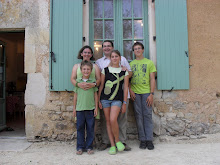Family games are a traditional way to bring parents and children together, with timeless classics. However, in the OPOL family games like Monopoly can have two meanings. For me, the cards represent my British childhood (Park Lane, Trafalger Square), while Jacques’ has a more chic version (
Champs Elysées, Rue de la Paix). The children have played both versions and, frankly, they prefer the French one, for the practical reason that their French cousins and friends can play too. Marc and Nina said they got sick of explaining the value and cultural meaning of London property sites, and dealing in pounds when they could use euros.
Never agree to play Trivial Pursuit in your second language, unless you have a degree in the History and Culture of the language. At a recent village Games Night I naively joined the Trivial Pursuit table, thinking I could easily score some points for my team. But the only question I could answer was ‘Which three languages are spoken in Luxembourg?’ Otherwise, fifty classic French culture, people, sport and music questions passed straight over my head. It was humiliating. Bingo is a simple game of cards and numbers that any person can play and is popular in the villages in winter. But what if half the family has problems with French numbers over sixty? (That’s me and Gabriel, by the way). While the others coolly serve themselves drinks I desperately try to find
‘quatre-vingt-douze’ (20 x 4 +12, or 92). And when I finally fill in all the gaps do I shout ‘Bingo!’ or ‘
Loto!’?
On the early evening family television game shows we watch together Nina is quick to fill in the blanks in the French version of ‘Wheel of Fortune’, while I am still working out what the question meant in the first place. In the French version of ‘Who wants to be a Millionaire?’ I can only answer those trick questions designed to catch the French out, like what is the name of the famous clock in London a) Big Mac, b) Big John, c) Big Ben or d) Big Boy? ‘Yes!’ I shout ‘I know that one. It’s c!!’ as the children groan and say everyone knows that answer.
A classic drawing game, Pictionary, should be transferable across cultures. A recent game of with a group of French-English bilingual children showed a technical problem with languages. The word was ‘Seal’. One child scribbled a drawing and one team yelled ‘Seal!’ as the others screamed ‘Phoque!’ simultaneously. This particular French word is banned in our house (after Marc once said to my mum while watching a nature programme, ‘Oh, look, a
phoque…’). As referee I disqualified the team who said the bad word. They cried injustice and argued that any word in any language could be used and the rules do not state which language the game must be played in. ‘You have to choose one language,’ I say, ‘It would create total chaos if we all spoke three or four different languages.’ The children disagree and decide to take me to the European Court of Human Rights for inhumanity towards bilinguals…





